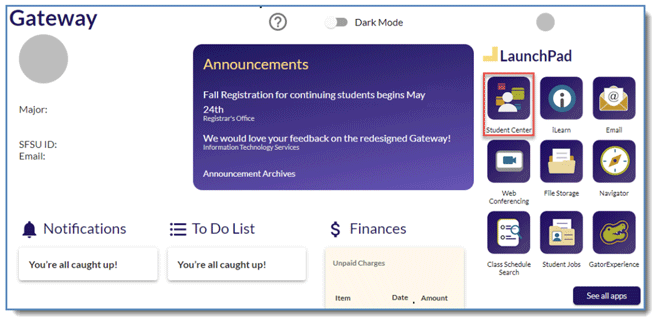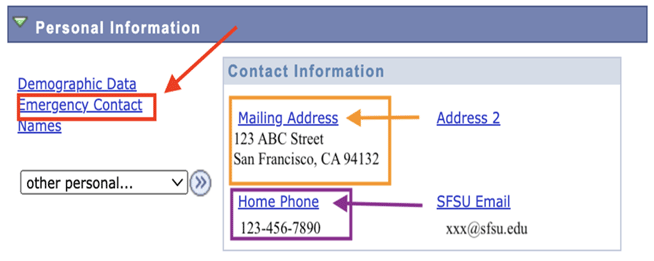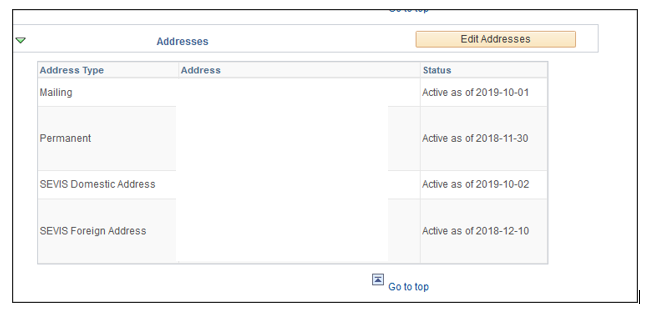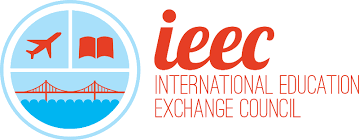Review the requirements below, and contact an international student advisor if there is need for clarification regarding how the regulations apply to students.
Both F-1 students and J-1 students are responsible for learning, understanding, and complying with the U.S. laws and regulations regarding their F-1 or J-1 status.
Failure to understand and comply with F-1 or J-1 regulations (such compliance is often referred to as “being in status” or “maintaining status”) may jeopardize both students’ legal status in the United States and future academic plans.
Short-term program students, including those in customized programs, SF Discover and STEM Exploration, are also responsible for maintaining their required insurance and reporting their information, such as their U.S. mailing address, phone number and emergency contact information.
Student Responsibilities
F-1 and J-1 students, as well as students in SF Discover, STEM Exploration and short-term custom programs must comply with international student health insurance requirements. Visit the link below to learn more about the international student health insurance requirement and U.S. health care.
Personal Contact Information
All CGE students must provide their U.S. residential address, phone number, and personal email address to SF State by orientation day. If there are any changes to this information afterward, you must report the changes within 10 days.
Failure to report one’s U.S. address and phone number will result in termination of the student’s SEVIS record and I-20 or DS-2019. Termination indicates that the student is “out of status” and will accrue unlawful presence while in the United States until status is regained. A record of unlawful presence may have a detrimental effect on future U.S. immigration.
Type of Addresses
Each student should report two types of address:
U.S. Mailing Address/Physical Address:
- This is student’s physical address in the U.S.
- The mailing address should not be outside California.
- Students living in on-campus housing must update their "Mailing Address" even if they have "Dormitory" address on the Student Center.
Permanent Address/Foreign Address:
- This is the student’s permanent address outside the U.S. which was provided to SFSU during the admissions process.
- A F-1 and J-1 student's permanent address cannot be an address IN the U.S.
- Students who wish to change their permanent address reach out to globaled@sfsu.edu for next steps.
Updating U.S. Mailing Address and Phone Number
Step 1: Log in to SFSU Gateway / MySFSU and click the ‘Student Center’ on the top of the tiles (see the image).

Step 2: Scroll down to the “Personal Information” section. Click “Mailing Address” to update the U.S. mailing address or "Home Phone" to update the U.S. phone number. Click “Edit” to enter the current U.S. mailing address or U.S. phone number. Make sure to click the “OK” button FIRST and then click “Save”.

Additional Information for F-1 Students
"SEVIS Domestic Address:" The SEVIS Domestic Address is the U.S. address associated with the student’s SEVIS record. When students update their U.S. Mailing Address using their Student Center, their SEVIS Domestic Address is automatically updated to reflect the same information. Students cannot manually update information in this field.
"SEVIS Foreign Address:" The SEVIS Foreign Address is the foreign, permanent address associated with the student’s SEVIS record. When students update their permanent address with the SFSU Registrar’s Office, their SEVIS Foreign Address is automatically updated to reflect the same information. Students cannot manually update information in this field.

An emergency contact can be a lifesaver in the event of all kinds of emergency. Students' emergency contacts should be someone who needs to be notified if something happen to them. The emergency contact should know students well personally. Revisit emergency contacts every once a while and make necessary changes or updates.
IMPORTANT: Do not put yourself as your own emergency contact.
CGE recommend students to provide at least two emergency contacts at online Student Center:
1st contact: This should be one of family members, relatives, friends, partners in their home countries.
2nd contact: This should be a back-up person in case the first contact cannot be reached. The 2nd emergency contact can be either inside or outside the U.S., but they should be someone who could get in touch with students' contact in their home countries.
Updating Emergency Contacts
Step 1: Log in to the Student Center and scroll down to the “Personal Information” section. Click “Emergency Contact.”
Step 2: Click “Add an Emergency Contact." Be sure to click "Save" when you are done.
Upload your immigration documents:
- Copy of your F-1 or J-1 visa
- I-94 record: You can verify that you have entered the United States in proper F-1 or J-1 status by downloading your I-94 arrival record via the following instructions:
- Go to I94 - Official Website (dhs.gov).
- Under "Already Visiting & Need Proof of Visitor Status?", select "Get most recent I-94".
- Click "I acknowledge and agree".
- Enter the required information.
- Download a pdf of your most recent I-94.
To upload your documents, please use the specific document submission box for program.
Full-Time Requirement
Both F-1 and J-1 students must enroll and maintain enrollment in a full-time course load each fall and spring semester. There are no enrollment requirements for summer or winter breaks.
What constitutes a full-time course load:
- ALI students must maintain a minimum of 20 hours/week during fall/spring and 25 hours/week during summer
- Certificate students: a minimum of 12 units per semester
- Semester @ SFSU undergraduate program students: a minimum of 12 units per semester.
- Semester @ SFSU graduate program students: a minimum of 8 units per semester.
- Summer in SF Students: 6 units/5-week term
- UPP students must maintain full-time enrollment as follows:
- 300 semester hours (20 hours/week in fall/spring and 30 hours/week in summer)
- Hours are distributed between unit-bearing and non-unit-bearing coursework
- Students will take 8 - 9 units in semester one and 10 - 13 units in semester two
- For language training, students will take:
- 15 hours/week in semester one
- 10 hours/week in semester two
- 16 hours/week if studying in summer
A maximum of 3 units of online classes may be counted towards the required number of units.
Completion of a Full-Time Course Load
Grades that count towards satisfying the full-time enrollment requirement are as follows: A, B, C, D, F, CR (Credit), NC(No Credit) and I (Incomplete) / IC (Incomplete Charged)*.
*F-1 students who receive an "I" (incomplete) grade for a course are given one calendar year (12 months) immediately following the end of the term in which the incomplete grade was assigned to make-up the necessary work for the class. Failure to complete the assigned work within this one year period will result in the "I" grade being converted into an "IC" grade.
Grades that do not count towards satisfying the full-time enrollment requirement are: W (Withdrawal), WU (Unauthorized Withdrawal) and AU (Audit).
What is an Online Course?
An online course is a course that does not require a student’s physical attendance for classes, exams, or other purposes integral to the completion of the class.
Students may enroll in as many online courses per semester as fit their academic plans; however, no more than the equivalent of one class or three (3) units may be counted towards the full-time enrollment requirement.
To Meet the Full-Time Requirement:
- Certificate and Semester @ SFSU Undergraduate Program students must enroll in a minimum of 12 units to consider full-time, of which at least 9 units must be in-person/hybrid.
- Semester @ SFSU Graduate Program students must enroll in a minimum of 8 units to consider full-time, of which at least 5 units must be in-person/hybrid.
F-1 students who are in their final semester at SFSU and need just one class to graduate are not allowed to stay in the U.S. if the class is only available online.
What is a Hybrid Course?
A hybrid course is NOT considered an online course. A hybrid course is a course that requires physical attendance for at least one component. This could be an orientation, exam, seminar or any other activity that requires the student to come to campus. All units from hybrid courses may be counted toward the full-time requirement.
Examples
The Following Combinations Meet the Undergraduate Full Time Requirement:
- 9 units of in-person or hybrid courses and 3 units of online courses
- 9 units of in-person or hybrid courses and 6 units of online courses
- 12 units of in-person or hybrid courses and 6 units of online courses
The Following Combinations DO NOT Meet the Undergraduate Full Time Requirement:
- 6 units of in-person or hybrid courses and 6 units of online courses
- 3 units of in-person or hybrid courses and 9 units of online courses
The Following Combination Meets the Graduate Full Time Requirement:
- 5 units of in-person or hybrid courses and 3 units of online courses
The Following Combination DOES NOT Meet the Graduate Full Time Requirement:
- 3 units of in-person or hybrid courses and 5 units of online courses
Students’ academic standing at SFSU may also affect their immigration status. Students who fall out of good academic standing will be placed on Academic Notice and may be subject to Disqualification of Status. Academic Notice is generally associated with a GPA below 2.0.
Students considered in F or J status while on Academic Notice or Subject to Disqualification, as long as they maintain full-time enrollment and meet all other requirements. However, students may lose benefits, such as on-campus employment approval, until they regain good academic standing. Students may also be required to supply further documents detailing the steps they are taking to regain academic standing (e.g., proof of attending tutoring, professors’ office hours, etc.). Failure to comply with such requests may result in program termination.
Immigration Consequences
F-1 students who have been disqualified form SFSU will not be able to maintain F-1 status at SFSU. The student must transfer their SEVIS records and I-20s to other Student and Exchange Visitor Program (SEVP) certified schools in order to remain in the U.S.
F-1 Students Only
J-1 Students Only
Reduced Course Load (RCL) Due to Medical Condition
Who is Eligible?
J-1 students may be eligible for Reduced Course Load (RCL) Due to Medical Condition if they experience a temporary illness or injury that prevents them from maintaining full-time study.
What to know about RCL Due to Medical Condition
J-1 students who wish to request RCL Due to Medical Condition must request a U.S. licensed medical doctor (MD), doctor of osteopathy (DO), or licensed clinical psychologist to complete the RCL Due to Medical Condition form. Alternatively, students may attach to their RCL form an original letter from the medical care provider (on the provider’s official letterhead) substantiating the student’s medical condition. Such a letter must contain a brief but detailed description of the student’s medical condition and recommend that the student enroll in either zero units or in a part-time course load for the semester.
The student must resume full-time study in the next available fall or spring semester in order to maintain legal status unless a second RCL Due to Medical Condition is approved. A separate RCL Due to Medical Condition must be completed and approved each semester if more than one semester of RCL approval is required.
Deadlines:
If the student’s medical condition occurs before the beginning of the semester: RCL Due to Medical Condition must be approved by an exchange student advisor before the drop/add deadline.
If the student is enrolled full time and a medical condition occurs during the current semester: The student should contact a J-1 student advisor as soon as possible. RCL Due to Medical Condition cannot be approved retroactively after the semester ends. The student must request RCL Due to Medical Condition BEFORE the end of the semester.
How to request RCL Due to Medical Condition
- Review the RCL Due to Medical Condition information above. Download the RCL form, and complete it as instructed.
- Email the completed RCL form to exchange@sfsu.edu to schedule a virtual appointment with a J-1 student advisor. The document will be processed within 5 business days.
- If able, discuss the situation with a J-1 student advisor during the virtual appointment. The adviser will assess the situation and notify the student of approval within 5 business days.
Reduced Course Load (RCL) Due to Academic Difficulty
Who is Eligible?
Students may be eligible for Reduced Course Load (RCL) due to Academic Difficulty if they experience academic difficulties that prevent them from maintaining full-time enrollment.
What to know about RCL Due to Academic Difficulty
Federal Immigration regulations define academic difficulty as Initial difficulty with English Language or reading requirements (first semester in the U.S. only); or unfamiliarity with U.S. teaching methods (first semester in the U.S. only); or improper course placement. Eligible students MUST apply for RCL Due to Academic Difficulty before the add/drop deadline. RCL due to Academic Difficulty cannot be approved retroactively for previous semesters.
Students who wish to request RCL Due to Academic Difficulty must complete the RCL Due to Academic Difficulty form must speak with a J-1 student advisor at DoIE first to verify eligibility. The RCL form must be approved by the student, exchange student advisor, and study abroad advisor at the student’s home university.
Once RCL Due to Academic Difficulty has been approved, students must:
- Register for a minimum of six units (for undergraduates) or four units (for graduates) in the approved semester AND
- Resume full-time studies during the next available fall or spring semester in order to maintain legal status (only if studying at SFSU during the next semester).
How to request RCL Due to Academic Difficulty
- Review the RCL Due to Academic Difficulty information above. Download the RCL form, and complete it as instructed.
- Email the completed RCL form to exchange@sfsu.edu to schedule a virtual appointment with a J-1 student advisor. The document will be processed within five business days.
- If able, discuss the situation with a J-1 student advisor during the virtual appointment. The adviser will assess the situation and notify the student of approval within five business days.

The International Education Exchange Council (IEEC) is the largest student organization at SFSU. With its focus on cross-cultural exchange, IEEC hosts internationally focused events, such as the Study Abroad Fair, and is a fantastic way to meet both fellow exchange students and U.S. students interested in international education and global issues.
Semester @ SFSU students are not required to contribute to IEEC, but are welcome to.
Some J-1 Visitors are subject to Section 212(e) of the Immigration and Nationality Act, also known as the Two-Year Home Residency Requirement or Two-Year Home Country Physical Presence Requirement. Students subject to the 212(e) must be physically present in their country of nationality or last legal permanent residence for at least two years (either consecutive or an aggregate) after completing their J-1 program and leaving the United States prior to applying for certain U.S. visas or U.S. permanent residence.
Exchange students will be subject to the 212(e) in the following situations:
- The student’s J-1 program was supported financially either directly or indirectly by the U.S. government or the government of the student’s home country.
- The student’s J-1 subject area has been designated as a desirable skill by the government of the student’s home country (view the Exchange Visitor Skills List for additional information).
Students subject to the 212(e) will find this information reflected on their Form DS-2019 and J-1 visa.
Consequences of the 212(e)
A person subject to the 212(e) MAY NOT apply for the following U.S. visas until they have fulfilled the Two-Year Home Residency Requirement or obtained a waiver: H-1B temporary worker visa, L visa, K visa, or U.S. permanent residence.
A person subject to the 212(e) MAY apply for the following U.S. visas prior to fulfilling the Two-Year Home Residency Requirement or obtaining a waiver: F-1 visa, J-1 visa, O-1 visa, B-1/B-2 visa, among others.
212(e) Waiver
Students subject to the 212(e) may request a waiver from the U.S. State Department. Waivers are granted only in certain circumstances, and the Office of International Programs is unable to assist J-1 students or scholars with the waiver process.
J-1 visa holders with questions about the 212(e) / Two-Year Home Residency Requirement should contact a J-1 student advisor at DoIE.
J-1 visa holders with questions about J-2 dependents should contact a J-1 student advisor at DoIE.
Students approved to extend their period of study or participate in Academic Training immediately after their SFSU studies end will receive a new DS-2019 with extended program dates that meet the duration needed to complete their additional period of study or Academic Training. Please see the Employment - Academic Training section for further information.
If students wish to extend their period of study for an additional semester, they must first speak to a J-1 student advisor no later than November 1 for the fall semester and April 1 for the spring semester.
It is possible for a J-1 visa holder’s spouse and/or children (21 and under) to accompany them during their program in the United States by entering the country in J-2 dependent status. J-2 dependents may legally remain in the United States as long as the primary (J-1) visa holder maintains legal status.
What to Know about J-2 Status
Duration: The duration of a J-2 visa holder’s right to remain in the United States may not exceed the length of the associated J-1 visa holder’s program. Additionally, a J-2 visa holder’s right to remain in the United States may be extended if the associated J-1 visa holder’s program is extended. When the associated J-1 visa holder completes their program and leaves the United States, any J-2 dependents must leave as well.
Grace Period: Like J-1 visa holders, J-2 visa holders receive a 30-day grace period after the end date on their DS-2019. During the grace period, J-2 visa holders may travel within the United States, but they may not leave and re-enter the United States with their expired DS-2019 immigration document.
Health Insurance: As with J-1 visa holders participating in a program at SFSU, J-2 dependents must purchase and maintain SFSU-specified health insurance for the duration of their program.
Employment: J-2 visa holders may be authorized for employment by U.S. Citizenship and Immigration Services for the duration of the associated J-1 visa holders program as indicated on their DS-2019 or a period of four years, whichever is shorter. In order to work, J-2 dependents must apply for and obtain a Social Security Number. J-2 dependents who work are subject to federal and local income tax.
J-1 visa holders with questions about J-2 dependents should contact a J-1 student advisor at DoIE.